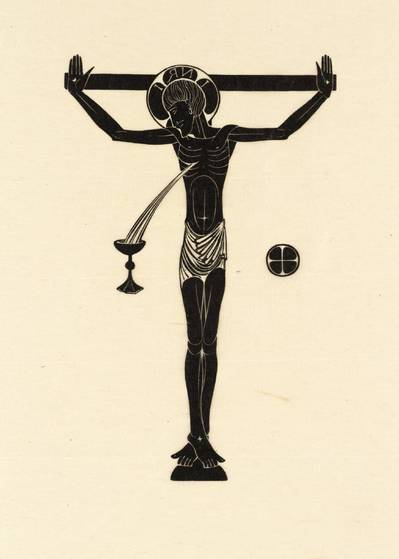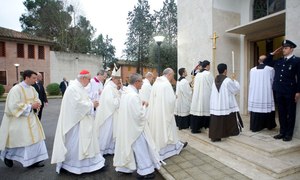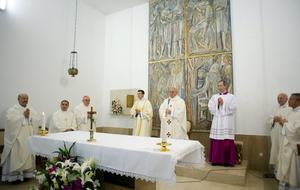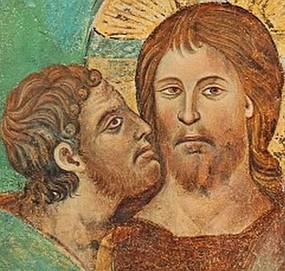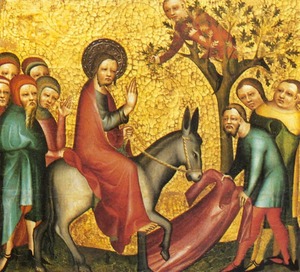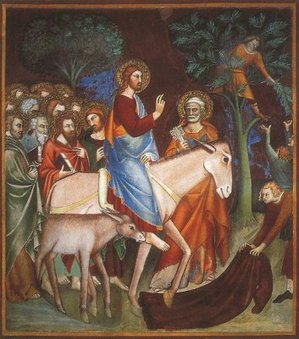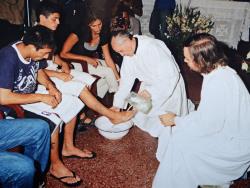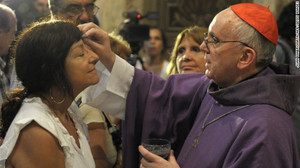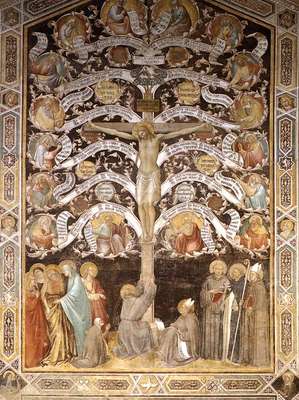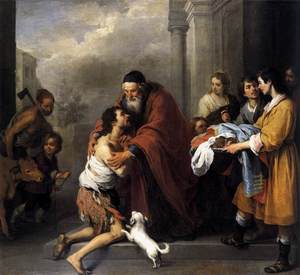Category: Lent & Holy Week
Francis’ homily for Holy Thursday 2013
Lent ends and the sacred Triduum begins with the Mass of Our Lord’s Supper, with the rite of Washing of Feet (known also as the Mandatum). In Rome, the Pope offered Mass at the Casal del Marmo, an inner city detention center. In the chapel dedicated to the title of “Father of Mercies,” were 40 young detainees gathered around him for Mass, 12 youth, Catholics and non-Christians, 2 of whom were young women and 2 Muslims, had their feet washed by the Pontiff. Concelebrating the Mass were Cardinal Agostino Vallini (the Pope’s Vicar for the Diocese of Rome), Archbishop Giovanni Angelo Becciu (‘Substitute for General Affairs of the Secretary of State), Monsignor Alfred Xuereb, (Chaplain to the Casal del Marmo, and papal secretary), 2 deacons, one deacon from the Seminario San Carlo (the Seminary of the Fraternity of St Charles Borromeo) and another, Brother Roi Jenkins Albuen, a Capuchin of the “Addolorata” with Father Gaetano Greco. Also there were two young seminarians from the Roman Seminary with the assistant chaplain, Colombian Father Pedro Acosta.
Pay attention to what the Pope says!!!! Also, some photos.
Here’s Vatican Radio transcript and translation of the Holy Father’s unscripted homily:
“This is moving, Jesus washes the feet of his disciples. Peter understands nothing. He refuses but Jesus explains to him. Jesus, God did this, and He Himself explains it to the disciples.. ‘Do you realize what I have done for you? You call me ‘teacher’ and ‘master,’ and rightly so, for indeed I am. If I, therefore, the master and teacher, have washed your feet, you ought to wash one another’s feet. I have given you a model to follow, so that as I have done for you, you should also do’.
The contrite heart
St. Symeon the New Theologian, The Discourses, (Paulist Press, 202-203)
Spy Wednesday
Spy Wednesday, Wednesday in Holy Week, is unique as the sacred Liturgy prepares us to pray the sacred Triduum in a more devoted, sincere way. The gospel for today unfolds the drama. Hence, Spy Wednesday a pious way to commemorate and remind ourselves how, why and for what Judas Iscariot’s betrayal of Jesus for thirty pieces of silver is a learning experience for each of us. The betrayal of Jesus by Judas –a friend of the Lord’s, a member of the 12 Apostles, a man responsibility– continues until today to make us pause and to ask what happened; Judas’ tortured ending grieve us.
The mystery of the dramatic events concerning Judas and Jesus shows us the value God places on the gift of free will. The sinfulness of some of our choices are too often motivated by money, power, and fame, the desire to be right on everything, to point fingers without looking deeply within our selves. Consider the various things Pope Francis has said since his election about the devil and his enticements. In the Liturgy we pray for the grace to have the power of the enemy driven from us thus attaining the grace of the resurrection.
Jesus made an ass of Himself
Bishop Hugh Gilbert, OSB, bishop of Aberdeen, Scotland, tells us about Christ, the donkey and our willingness to become useful for Christ.
Palm Sunday: Keep your eyes on the Lord
In the procession the people meet Jesus with palm branches, in the passion they slap him in the face and strike his head with a rod. In the one they extol him with praises, in the other they heap insults upon him. In the one they compete to lay their clothes in his path, in the other he is stripped of his own clothes. In the one he is welcomed to Jerusalem as just king and savior, in the other he is thrown out of the city as a criminal…If, then, we want to follow our leader without stumbling through prosperity and through adversity, let us keep our eyes upon him, honored in the procession, undergoing ignominy and suffering in the passion, yet unshakably steadfast in all such changes of fortune.
Blessed Guerric of Igny
Pope moves Holy Thursday rites to a juvenile prison
The Holy See Press Office said today that Pope Francis will celebrate the Holy Thursday Mass of the Lord’s Supper at the juvenile prison ‘Casal del Marmo’ in Rome. Known as Maundy Thursday is the first of the Three Sacred Days in Holy Week leading to Easter Sunday; this Liturgy is rooted John 13. The Mass of the Lord’s Supper, commemorates the institution of the Holy Eucharist and the priesthood. The Mass on Holy Thursday recalls that Jesus washed the feet of His disciples as an example of love, of service ; the washing of the feet known as the ‘mandatum.’
As Archbishop of Buenos Aires, as you can note in the picture, Cardinal Jorge Bergoglio celebrated Mass in a prison, hospital or hospice for poor and marginalized people. This move from Saint John Lateran to the prison is consistent with Francis’ previous pastoral priorities.
On 18 March 2007, Pope Benedict offered Mass in this same prison.
Pope Francis: What is your Lenten Gesture of Solidarity?
An English Translation of Cardinal Bergoglio’s Lenten Letter 2013
And rend your hearts, and not your garments, and turn to the Lord your God: for he is gracious and merciful, patient and rich in mercy, and ready to repent of the evil. (Joel 2:13)
Little by little we become accustomed to hearing and seeing, through the mass media, the dark chronicle of contemporary society, presented with an almost perverse elation, and also we become [desensitized] to touching it and feeling it all around us [even] in our own flesh. Drama plays out on the streets, in our neighborhoods, in our homes and — why not? — even in our own hearts. We live alongside a violence that kills, that destroys families, that enlivens wars and conflicts in so many countries of the world. We live with envy, hatred, slander, the mundane in our heart.
Continue reading Pope Francis: What is your Lenten Gesture of Solidarity?
Through the Cross, that Wondrous Tree
On this Fifth Sunday of Lent we approach the Cross of Jesus, the Tree of Life!
Finding Jesus in the temple
Teaching, there the leaders brought
Forth a woman caught in sinning:
Trapping Him was in their thoughts.
Then, instead of giving answers,
Jesus wrote upon the ground.
“Let the sinless start the stoning.”
Looking up, no one was found.
“See,” the prophet said in gladness,
“God is doing something new!
Cleansing, living waters, flowing
For us all with mercy true.”
Each of us has known the wonder
Of forgiveness, full and free
In the mercy we are given
Through the Cross, that wondrous Tree.
Laetare Sunday
Rejoice, Jerusalem, and all who love her. Be joyful, all who were in mourning; exult and be satisfied at her consoling breast.
Laetare Jerusalem: et conventum facite omnes qui diligitis eam: gaudete cum laetitia, qui in tristitia fuistis: ut exsultetis,et satiemini ab uberibus consolationis vestrae.
With the Church we pray
O God, who through your Word reconcile the human race to yourself in a wonderful way, grant, we pray, that with prompt devotion and eager faith the Christian people may hasten toward the solemn celebrations to come.
In the Mass of Paul VI today’s gospel, if you don’t have catechumens at Mass, is the parable of the Prodigal Son. We know both sons have no clue of who they are persons without the father indicating their moral and human reality. The sons clearly miss the point of their familial sonship. This biblical narrative is heard in the Church as one of the many examples of nature of the Church, especially considering the role of the father. Here we understand the father not only be to biological father of children who need teaching but he stands for the Church who teaches but also reconciles, corrects error but rejoices in a return.
Saint John Chrysostom teaches,
There were two brothers (Luke 15:1-3, 11-32): they divided their father’s goods between them and one stayed at home, while the other went away to a foreign country, wasted all he’d been given, and then could not bear the shame of his poverty…The reason the father let him go and did not prevent his departure for a foreign land was that he might learn well by experience what good things are enjoyed by the one who stays at home. For when words would not convince us God often leaves us to learn from the things that happen to us. When the profligate returned…,the father did not remember past injuries but welcomed him with open arms…Are you asking: ‘Is this what he gets for his wickedness?’ Not for his wickedness, but for his return home; not for sin, but for repentance; not for evil, but for being converted.
